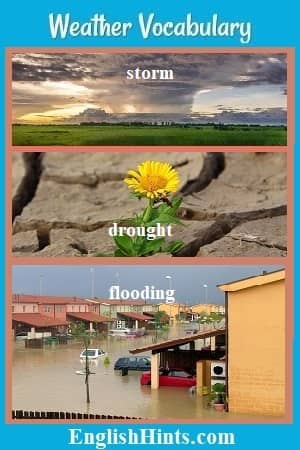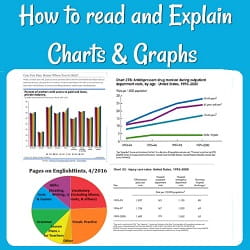Climate Change & Weather Vocabulary
You need to understand climate change and weather vocabulary to read the news or discuss science (or politics!) in English . The reading selections and exercises below will give you the vocabulary you need.
These short articles explain the basic concepts of weather and climate change.
Each time you read a new word you get a little better understanding of how and when to use it. That's why reading several perspectives on the same subject helps you learn vocabulary.
To remember these new words you need to do something with them. Your memory forms lasting connections when you group them and match them with their meanings.
Basic Information on Weather & Climate Change
Background: some effects of climate change.
Key vocabulary for understanding weather, climate, and global warming.
Here’s an example of a context clue (explaining precipitation). Another page has a definition (as well as a clear illustration) of drought.
This article discusses areas of certainty and disagreement among climate scientists. (Certainties: climate change is happening, and human activities are pushing it. Disagreement: how much? how fast? is it reversible?)
Adapting to Climate Change
Compare this article with the pictures and ideas in this TED talk. Are they saying the same thing? It’s great English practice if you can summarize three key thoughts from the TED talk or the article.
Voice of American (Learning English) News added an article on climate action concerns after the 2016 American election. They also have a useful glossary explaining less common words in the article.
Practice Climate Change & Weather Vocabulary
Now that you have seen examples of how these words are used, it’s time to practice them.
One way to practice vocabulary is to group words into categories. Which of the words listed below are related to the weather? Which are causes of climate change? Which are effects? Which ones are verbs? (Some of those can also be nouns.) Some words will be on two lists.
Don’t stress over this. Treat it as a game—making connections that will help you remember any new words.
adapt, affect, climate change, drought, emissions, flooding, fossil fuels, global warming, greenhouse gases, hurricanes, impact, increase, precipitation, reduce, storms, temperature
Weather Vocabulary
Effects of C.C.
Causes of Climate Change
Verbs
The answers are at the bottom of the page, but please don’t look until you have tried to list them yourself.
Match Climate Change Vocabulary & Meanings
adapt, affect, consequences, drought, emissions, flooding, fossil fuels, global, greenhouse gases, hurricanes, impact, increase, precipitation, reduce, region, temperature
Match the words in the vocabulary list above to their meanings. (You can just write the letter and then the word on a piece of paper, to check when you finish):
A. major tropical storms,
B. effects of an action,
C. rain & snow
D. an area or part of a country or of the world
E. to make needed changes to adjust to changing conditions
F. water suddenly covering areas that are usually dry land
G. get bigger
H. make smaller
I. gases or chemicals released into the atmosphere
J. make a difference (to something or someone)
K. extended dry period
L. energy sources like petroleum, coal, and gas
M. relating to the whole earth
N. a major effect
O. a measure of how hot or cold something is
P. gases like CO2 and methane that trap heat and contribute to global warming
Climate Change & Weather Vocabulary Answers
Weather Vocabulary
drought
flooding
hurricanes
precipitation
storms
temperature
Causes of Climate Change
(gas) emissions
fossil fuels
(global warming)
greenhouse gasses
Effects of C.C.
drought
flooding
hurricanes
storms
(also rising sea levels-- not on vocab. list)
Verbs
adapt
affect
impact
increase
reduce
(impact and increase can also be nouns.)
(Don’t worry if your list is not quite the same a mine. This is not a right-or-wrong exercise. It's a chance to think about the relationships between words. (This is one of the best ways to add new words to your personal vocabulary—by relating them to words you already know.)
Matching Answers
A. hurricanes- major tropical storms,
B. consequences (or impacts) -effects of an action,
C. precipitation- rain & snow
D. region- an area or part of a country or of the world
E. adapt- to make needed changes to adjust to changing conditions
F. flooding- water suddenly covering areas that are usually dry land
G. increase- get bigger
H. reduce- make smaller
I. emissions- gases or chemicals released into the atmosphere
J. affect- make a difference (to something or someone)
K. drought- extended dry period
L. fossil fuels- energy sources like petroleum, coal, and gas
M. global- relating to the whole earth
N. impact – a major effect
O. temperature- a measure of how hot or cold something is
P. greenhouse gases- gases like CO2 and methane that trap heat and contribute to global warming
_______________________________
To practice other words related to climate change, see the gap-fill exercises in Disaster Assistance Vocabulary Exercises and Conservation Terminology (on global warming).
More Related Pages
Understand the way news is reported in English-speaking countries, with links to fairly easy news sites.
How much of this science vocabulary do you know? Find out with these category and matching games.
Examples & explanations of different kinds of charts and graphs, plus the most important vocabulary you need to discuss them yourself.
Home> Online Vocabulary Games in English > Climate Change & Weather Vocabulary
Didn't find what you
needed? Explain what you want in the search box below.
(For example, cognates, past tense practice, or 'get along with.') Click to see the related pages on EnglishHints.
| site search by freefind | advanced |









